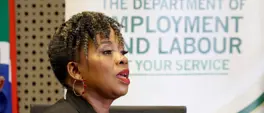MALAIKA MAHLATSI | Why Rand Water maintenance is crucial for Gauteng's long-term water security
Malaika Mahlatsi
23 July 2025 | 10:50The extensive maintenance that is currently being undertaken by the bulk water utility, Rand Water, has resulted in various suburbs across the province being affected by limited water supply.

A Rand Water maintenance team on site at the Bergbron water utility site in Johannesburg on 25 June 2024 where they are conducting planned maintenance. Picture: Jacques Nelles/Eyewitness News
Over the past few weeks, residents of Gauteng have been airing their frustrations about the ongoing maintenance of water infrastructure in the province.
The extensive maintenance that is currently being undertaken by the bulk water utility, Rand Water, has resulted in various suburbs across the province being affected by limited water supply.
Although Rand Water, in close coordination with municipalities, has ensured that households and businesses across the province have access to water during the maintenance process, communities are reasonably frustrated by some delays in the restoration of water to their taps.
These delays have been the result of several factors, including the vandalism of infrastructure. On the 5th of July, following maintenance work at Zwartkopies, Rand Water discovered two pipe bursts on a pipeline between Zwartkopjes Farm and the Mall of the South.
The air valves at the said locations had been vandalised. In a statement released by the water utility on the day, it was explained that as a result of the internal pressure during recharging, both compromised air valves were blown off, causing a water upsurge visible from kilometres away. Unfortunately, the vandalism of Rand Water infrastructure is very common in and around informal settlements, where the vandalised pipeline runs.
Across Gauteng, water infrastructure is under serious threat of vandalism – and it goes beyond pipelines. During the data collection phase of my Masters of Science in Water Resource Science dissertation, I visited various dams, wastewater treatment works and reservoirs across the City of Tshwane and bore witness to the extensive vandalism on municipal water infrastructure.
At Leeukraal Dam in Hammanskraal, the damage is so absolute that some structures had to be abandoned and new ones rebuilt. It is a serious issue that needs urgent attention from the government and other stakeholders, with interventions such as the provision of security personnel at water infrastructure points necessary.
The people of Gauteng are frustrated about the maintenance work that is being undertaken across the province – and their frustrations are not entirely unreasonable. It is therefore important that those in government, as well as those in academia who are conversant on water resource science, engage with the broader community about why this maintenance work is so crucial for the long-term water security of the province.
Regular maintenance of water infrastructure is crucial for ensuring a reliable, safe, and cost-effective water supply. Neglecting maintenance can lead to leaks, contamination, and ultimately, costly repairs and disruptions to service. Proactive maintenance helps extend the lifespan of assets, improve efficiency, and prevent major failures.
Addressing minor issues before they escalate into major problems saves significant money on emergency repairs and replacements. The City of Tshwane is a perfect example of this. As far back as 2004, it was already identified that preventative maintenance was urgently required at the Rooiwal Wastewater Treatment Works.
At the time, the cost of this substantial refurbishment was estimated at just over R500 million. But by 2021, after years of maintenance work being neglected, the cost of renovations and upgrading of the plant had increased to over R2 billion.
Had maintenance been done when it needed to be done, it would have saved the municipal and national government a lot of money. This money could have been directed towards improving and increasing water infrastructure in a city that is experiencing population increase at a time when the South African fiscus is significantly constrained.
In addition to this, well-maintained pumps and treatment systems operate more efficiently, leading to lower energy costs. Aged infrastructure is costly, and it consumes a lot of energy. Furthermore, preventative maintenance also reduces the likelihood of unexpected shutdowns and service interruptions, minimising inconvenience and the economic impact of water loss.
This economic impact is particularly devastating to small businesses that do not have adequate resources to withstand the financial impact of even just a day’s loss of water. In my research in Hammanskraal, I interviewed many small business-owners who were forced to close or scale down their enterprises when the township became the epicentre of the cholera outbreak in 2023.
Maintaining water infrastructure is also a public health issue. Clean and properly maintained water systems minimise the risk of waterborne diseases and other health hazards. Additionally, maintaining treatment plants and distribution systems ensures that water is safe for drinking and other uses, preventing not only the emergence and spread of waterborne diseases, but also the exacerbation of communicable diseases.
Limited access to safe, reliable water sources resulting from lack of water infrastructure maintenance significantly increases the risk of communicable diseases primarily due to compromised hygiene and sanitation processes, which facilitate the transmission of pathogens through contaminated water and food, as well as direct contact.
For the environment, proper water infrastructure maintenance reduces the risk of leaks and spills, minimising environmental damage. Gauteng has a crisis of potholes, all of which are related to ageing infrastructure, including ageing water infrastructure. Water spills as a result of pipe leaks, and the resulting water damage is a significant contributor to pothole formation.
The water seepage into weak points in the road surface weakens the underlying structure, and when combined with the pressure of Gauteng traffic (the province has the most congested road network and experiences the most severe traffic in South Africa), can lead to the creation of potholes.
It is clear that maintenance of water infrastructure has a direct impact on other public services, including public health. It has a direct impact on the natural and the built environment. It has an impact on the economy. And this is why Rand Water maintenance is crucial for Gauteng’s long-term water security and its very future.
Malaika, an award-winning and bestselling author, is a geographer and researcher at the Institute for Pan African Thought and Conversation. She is a PhD in Geography candidate at the University of Bayreuth in Germany.
Get the whole picture 💡
Take a look at the topic timeline for all related articles.
















